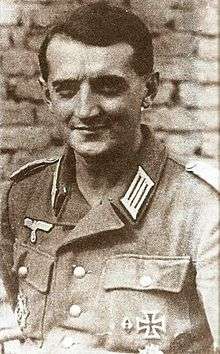Max Kloß
| Max Hermann Kloß | |
|---|---|
 Major Max Kloß | |
| Born |
14 March 1917 München, Germany |
| Died |
10 November 1944 (aged 27) Miskolc, Hungary |
| Buried at | Miskolc, Hungary |
| Allegiance |
|
| Service/branch |
|
| Years of service | ?-1944 |
| Rank | Major |
| Commands held | 2nd Battalion of the 144th Gebirgsjäger Regiment |
| Battles/wars | |
| Awards | Knight's Cross of the Iron Cross |
Max Hermann Kloß (usually referred to as Max Kloß) was a German Wehrmacht officer of World War II and recipient of the Knight's Cross of the Iron Cross, awarded to recognize successful military leadership or extreme battlefield bravery.
Career
Born in Munich in 1917, Max Kloß was a devoted, but not fanatical, National Socialist, who believed that Adolf Hitler's regime would be beneficial for Germany. He was enlisted for service to the Wehrmacht, and, upon completing his training as a commissioned officer,[1] he was initially sent to the Finnish Front.[2]
Kloß requested to be transferred to the Eastern Front, as he felt he was obliged to serve his country by fighting on a more decisive front than that of Finland. In early 1944, with the rank of Hauptmann, he took command of the second battalion of the 144th Gebirgsjäger Regiment (part of 3. Gebirgs-Division) in Ukraine.
With the Gebirgsjäger, Kloß earned many decorations towards the end of 1944, most notable the German Cross in Gold on 1 April 1944. With the tide of war now turning against Germany and the 3rd Gebirgs-Division fighting in northeastern Hungary, Kloß was promoted to Major in the late autumn.[3] On 26 November 1944, he was awarded the Knight's Cross of the Iron Cross, the second highest military decoration of Nazi Germany.
Death
On 10 November 1944, Kloß held a conference with other battalion commanders in a villa owned by an industrialist in Miskolc. Soviet artillery was present in the area and enemy observers were trying to spot and destroy any means of German communication. A shell scored a direct impact on the communications vehicle near the group of officers. Kloß was hit by a large piece of shrapnel which struck his head right below the right ear. Having been killed instantly, he was buried in the villa's yard.[3]
Awards
- German Cross in Gold on 1 April 1944 as Hauptmann in the II./Gebirgsjäger-Regiment 144[4]
- Knight's Cross of the Iron Cross on 26 November 1944 as Major and commander of the II./Gebirgsjäger-Regiment 144[5]
References
Citations
Bibliography
- Fellgiebel, Walther-Peer (2000) [1986]. Die Träger des Ritterkreuzes des Eisernen Kreuzes 1939–1945 — Die Inhaber der höchsten Auszeichnung des Zweiten Weltkrieges aller Wehrmachtteile [The Bearers of the Knight's Cross of the Iron Cross 1939–1945 — The Owners of the Highest Award of the Second World War of all Wehrmacht Branches] (in German). Friedberg, Germany: Podzun-Pallas. ISBN 978-3-7909-0284-6.
- Patzwall, Klaus D.; Scherzer, Veit (2001). Das Deutsche Kreuz 1941 – 1945 Geschichte und Inhaber Band II [The German Cross 1941 – 1945 History and Recipients Volume 2] (in German). Norderstedt, Germany: Verlag Klaus D. Patzwall. ISBN 978-3-931533-45-8.
- Scherzer, Veit (2007). Die Ritterkreuzträger 1939–1945 Die Inhaber des Ritterkreuzes des Eisernen Kreuzes 1939 von Heer, Luftwaffe, Kriegsmarine, Waffen-SS, Volkssturm sowie mit Deutschland verbündeter Streitkräfte nach den Unterlagen des Bundesarchives [The Knight's Cross Bearers 1939–1945 The Holders of the Knight's Cross of the Iron Cross 1939 by Army, Air Force, Navy, Waffen-SS, Volkssturm and Allied Forces with Germany According to the Documents of the Federal Archives] (in German). Jena, Germany: Scherzers Miltaer-Verlag. ISBN 978-3-938845-17-2.
- Wacker, Albrecht (2007). Eleutheros skopeutēs sto Anatoliko Metōpo ta apomnēmoneumata tu Zep Allermpernker katochu tu Stauru tōn Hippotōn tu Sidēru Stauru [Sniper on the Eastern Front: The Memoirs of Sepp Allerberger, Knight's Cross of the Iron Cross recipient]. Eurobooks Editions (Greek). ISBN 978-960-87218-7-6.